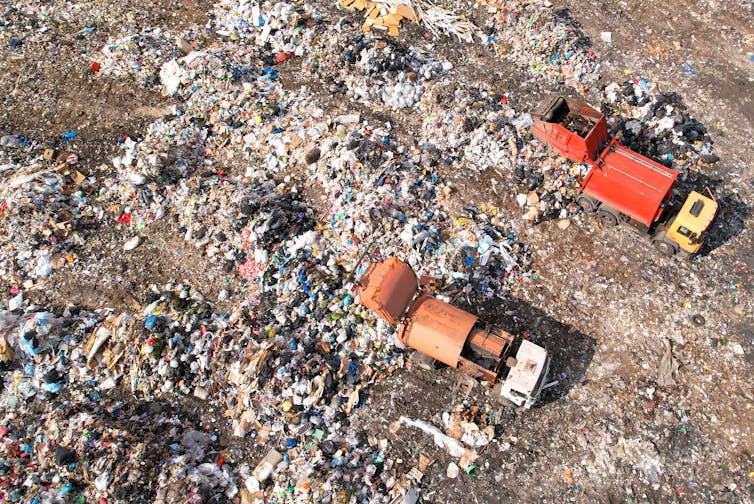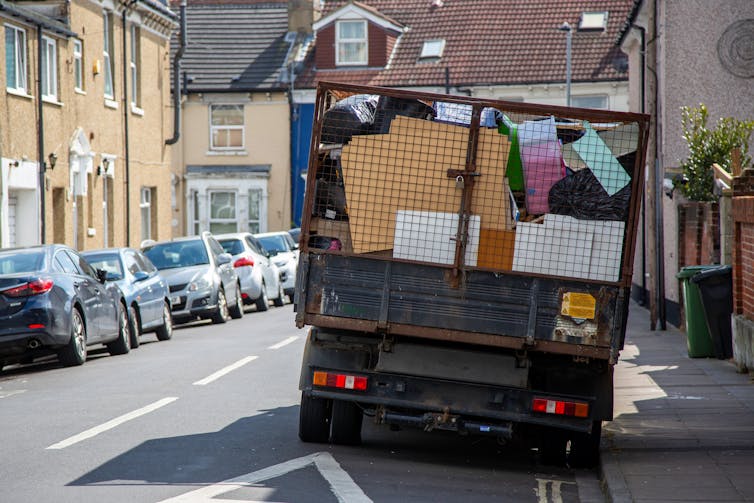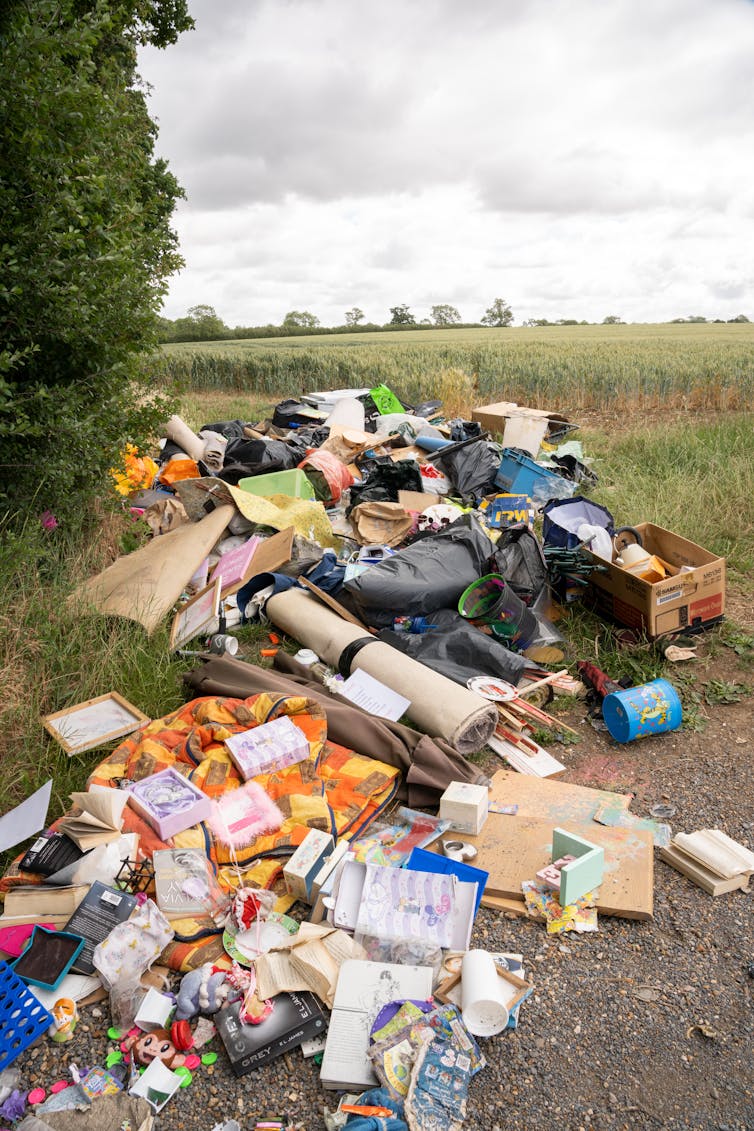Opinion: Waste crime - How online advertising platforms are facilitating illegal dumping

The new BBC podcast, (opens in a new window)Buried, by investigative journalists Dan Ashby and Lucy Taylor, is a compelling look at how criminals are infiltrating the UK waste disposal system. It opens with a tape recording by a trucker, on his deathbed. He tells the story of one of the worst environmental crimes in UK history – the illegal dumping of a million tonnes of waste near Derry in Northern Ireland.
While the extent of the offences on the Mobuoy Road site were discovered in 2012, bringing those responsible to justice has taken over a decade. Two people were finally (opens in a new window)sentenced at Laganside Court in Belfast in November 2022.
James Bevan, the head of the UK government’s Environment Agency (EA), (opens in a new window)has labelled illegal waste dumping the “new narcotics”. In England, about three (opens in a new window)unlicenced waste sites are detected every day by the EA. Local authorities deal with over one million fly-tipping incidents every year. The Buried podcast asks why so much of our waste is being disposed of in illegal ways and who exactly is responsible.
Cheap and easy waste disposal is (opens in a new window)big business. (opens in a new window)Research that I have led highlights the central role played by online platforms, which allow unregistered companies to advertise their waste disposal services, without scrutiny.

Unregistered waste handlers
In 2022, a (opens in a new window)study I worked on for the Department for Environment, Food and Rural Affairs (Defra) examined how the general public and businesses dispose of unwanted waste in England. Several methods were identified. These included giving waste to scrap metal merchants (17% public / 21% business), hiring a skip (13% public / 20% business), and paying for a man-and-van company (9% public / 16% business).
On the face of it, these methods don’t seem unusual or problematic. Most people using these services were confident that their items had been disposed of correctly. However, many people had paid in cash and didn’t receive a receipt. Many were unaware that anyone who transports waste in the course of their business has to be registered with the government (43%). They also didn’t know that if you use these services, you are legally supposed to check whether the company is registered or not.
In 2021, my colleagues and I conducted (opens in a new window)a study for the UK-based independent non-profit organisation, Material Focus, which found that nearly two-thirds (63%) of businesses offering to handle waste in England appeared to be unregistered. Evasion rates for comparative sectors, including (opens in a new window)television licences, (opens in a new window)car tax, (opens in a new window)fishing rod licences or (opens in a new window)benefit applications, usually fall between 1% and 8%. This makes the waste sector the biggest culprit, by far, of evasion and market failure in the UK.
Being unregistered means companies will probably obtain an unfair benefit over those in the registered sector because they are not paying disposal taxes. And since they are not allowed to use licensed disposal sites, they are also more likely to dispose of waste illegally.
In England, 86% of the man-and-van sector appears to be operating without registration, followed by skip companies (68%) and scrap metal merchants (61%). In total, our study estimated that over 238,000 businesses could be operating in the waste transportation sector without registration in England, with over 284,000 in the UK at large.
We also found strong evidence of connected organised networks involving such small operators. On one advertising platform alone, approximately 40% of over 10,000 national adverts for waste removal were probably placed by a handful of individuals or organisations.
In addition, we found a disconnect in waste crime investigations. While local authorities were focused on small fly-tipping incidents in their own areas, the Environment Agency was focused on very serious waste crime incidents. No one anticipated organised man-and-van networks advertising locally, but operating nationally. In other words, this suggests lots of small problems, that, if not dealt with, could lead to much more serious problems.

Insufficient measures
A 2023 Defra (opens in a new window)study that my colleagues and I did found that in areas where flytipping had increased, local authorities believed that the biggest influencing factor was unregistered carriers. The government is now considering (opens in a new window)electronically tracking waste and (opens in a new window)tighter regulation of carriers. Doubts remain, though, as to whether these measures will have much impact on those that aren’t registered. Moreover, they do not address the role online advertising platforms play in connecting people wanting rid of unwanted items to cheap and dodgy waste collectors.
The (opens in a new window)lack of regulation of social media and advertising platforms more broadly is a big concern. Research shows how these are being used by criminals for (opens in a new window)illegal activities globally, with governments across the world struggling to find solutions. In the UK, online advertising is not currently subject to the same level of regulation as other media, which the (opens in a new window)Online Safety Bill aims to improve. But this will have little impact on online advertising forums for things like waste removal.
Responsible platforms, which ensure rigorous background checks, only accounted for about 1% of all waste collection adverts. Instead, apparently unregistered waste operators seem to be basing their marketing strategies on platforms that do not conduct background or registration checks.
On Gumtree, 74% of waste collection adverts appeared to be from unregistered waste companies. At 64% and 60% respectively, Yell and Facebook weren’t far behind. Some of these platforms are generating significant sums of money from waste collectors. We found that an average spend per man-and-van on adverts on one platform appeared to be over £11,000 a year.
Under current UK legislation, people have to be caught in the act of dumping or transporting waste in order to be prosecuted – advertising while unregistered is insufficient, as evidence, to secure a conviction. So stricter legislation would help. But expecting the government to regularly monitor tens of thousands of adverts is probably wishful thinking. Instead, the online platforms should be held accountable too. They should implement better tools to prevent dodgy advertising.
Waste crime is so profitable that targeting unregistered operators will not reduce the problem of waste dumping and flytipping completely. We need to ensure that unregistered operators cannot access our waste in the first place. If we don’t, we run the risk of even greater environmental catastrophes than the Derry dump. By
(opens in a new window)Ray Purdy, Adjunct Senior Research Fellow in Environmental Law, (opens in a new window)University College Dublin
This article is republished from (opens in a new window)The Conversation under a Creative Commons license. Read the (opens in a new window)original article.






